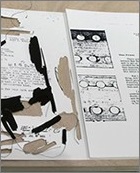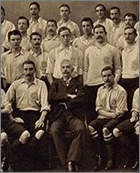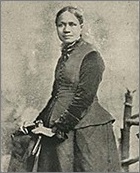In the New Readex Report: Surveilling Du Bois; a Famous Football Club; and Black Woman Journalists
In this issue: Big Brother's surveillance of an African-American activist; a ballyhooed British soccer club drops the proverbial ball; and formidable Black female voices in 19th-century media.
Resisting Repression: W. E. B. Du Bois and the Age of Global Surveillance
Phillip Luke Sinitiere, Scholar in Residence, W.E.B. Du Bois Center, UMass Amherst
 To commemorate the 50-year anniversary of W. E. B. Du Bois’s death in 2013, New York City artist Ann Messner created an installation at UMass Amherst titled “DuBois: The FBI Files.” Messner’s work addressed federal surveillance of the black radical scholar in the McCarthy era of ferocious anticommunism. She downloaded and printed all 800 pages of Du Bois’s file for the project. Her exhibit featured nearly 500 feet of Du Bois’s file placed on a long, slender 22-foot rectangular wooden table. The singular sheets Messner chose for the exhibit present some of the most heavily redacted, or inked out, parts of the file. The heart of her piece literally excised the redactions, what she called “the removal of the removal.”
To commemorate the 50-year anniversary of W. E. B. Du Bois’s death in 2013, New York City artist Ann Messner created an installation at UMass Amherst titled “DuBois: The FBI Files.” Messner’s work addressed federal surveillance of the black radical scholar in the McCarthy era of ferocious anticommunism. She downloaded and printed all 800 pages of Du Bois’s file for the project. Her exhibit featured nearly 500 feet of Du Bois’s file placed on a long, slender 22-foot rectangular wooden table. The singular sheets Messner chose for the exhibit present some of the most heavily redacted, or inked out, parts of the file. The heart of her piece literally excised the redactions, what she called “the removal of the removal.”
Messner’s stunning art provides a point departure to draw on Readex’s recently digitized Twentieth-Century Global Perspectives collection which also renders visible, to an even greater extent than his FBI file, Du Bois’s encounters with the surveillance state. > Full Story
“Typical English sportsmen and an exceedingly good lot”: The Corinthians and Soccer in South Africa
Chris Bolsmann, California State University Northridge, and Dilwyn Porter, De Montfort University
 They never played in a competitive league; they never won a knock-out competition; they were the champions of nowhere. Yet, by the time they visited South Africa for the first time in 1897—they went again in 1903 and 1907—the Corinthian Football Club was probably the most famous in the world. How did this happen? Why were those who hosted them so willing to roll out the red carpet on their arrival? And what was a team of English gentlemen amateurs doing in South Africa anyway, especially just before and after the South African War (1899-1902) when relations between the British and Afrikaner communities there were so precarious?
They never played in a competitive league; they never won a knock-out competition; they were the champions of nowhere. Yet, by the time they visited South Africa for the first time in 1897—they went again in 1903 and 1907—the Corinthian Football Club was probably the most famous in the world. How did this happen? Why were those who hosted them so willing to roll out the red carpet on their arrival? And what was a team of English gentlemen amateurs doing in South Africa anyway, especially just before and after the South African War (1899-1902) when relations between the British and Afrikaner communities there were so precarious?
As we discovered while researching English Gentlemen and World Soccer (Routledge, 2018) contemporary newspaper coverage of these sporting tours is immensely useful to historians seeking to answer these questions. > Full Story
Womanhood, Religion, and Slavery: Dialogues from the Readex African American Newspapers Series
Barbara McCaskill, Professor, Department of English, University of Georgia, and Michelle-Taylor Sherwin, PhD Student, Department of English, University of Georgia
 Nineteenth-century African American newspapers attracted black writers, subscription agents, printers, and readers eager to imbibe news and opinions from their own heterogeneous, diverse communities. They considered the impact of American slavery on global trade and commerce and global appropriations of African American culture and ideas. They ranged from commercial publications for multi-ethnic readerships, to those that emphasized religion and the cultural edification of their readers, to those that pressed the urgent matter of ending American bondage.
Nineteenth-century African American newspapers attracted black writers, subscription agents, printers, and readers eager to imbibe news and opinions from their own heterogeneous, diverse communities. They considered the impact of American slavery on global trade and commerce and global appropriations of African American culture and ideas. They ranged from commercial publications for multi-ethnic readerships, to those that emphasized religion and the cultural edification of their readers, to those that pressed the urgent matter of ending American bondage.
Jennifer Harris has demonstrated how such newspapers followed African-Canadian women writers and speakers such as Amelia E. Johnson, Mary Ann Shadd Cary, and Charlotte Elizabeth Linden. For the San Francisco Elevator, as Eric Gardner has found, the journalist Jennie Carter filed articles on topics from the Gold Rush to national politics. Reflecting the ambitions of African American newspapers to grow future literate, cultured black audiences... > Full Story
Subscribe today to receive the next issue of the Readex Report in your inbox. Browse previous issues in our archive. If you would like to suggest or contribute an original article, please email the Readex Report editor.



